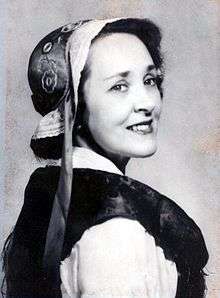Birgit Ridderstedt
| Birgit Ridderstedt | |
|---|---|
 Her regional folk costume from Stora Tuna in the Dales Province (Dalecarlia) was Birgit Ridderstedt's usual performing wardrobe. Photo: FamSAC. | |
| Background information | |
| Birth name | Ragnhild Birgit Anderson |
| Also known as | Bebe or Bibbi Ridderstedt |
| Born | November 26, 1914 |
| Origin | Sweden |
| Died | September 16, 1985 (aged 70) |
| Genres | Singer and producer |
| Years active | 1936–1973 |
.jpg)
Birgit Ridderstedt (November 26, 1914 – September 16, 1985) was a Swedish-American folk singer and cultural ambassador[1] who appeared at festivals and on television in the 1950s and early 1960s with material she produced herself.
Background
Born in Ludvika, Sweden, a daughter of Stefan Anderson and Ragnhild Fredrika Sandberg, she emigrated with her husband C. Erik Ridderstedt and their two small sons Stefan and Lars-Erik to the United States in 1950, settling in Chicago and later in Batavia, Illinois.
Career
Ridderstedt was a cultural personality who gave presentations on Scandinavian music and folklore on WTTW and WGN television in Chicago in the 1950s and early 1960s. Her career in introducing Scandinavian traditions to Americans began in assisting her husband's business as an importer of gift items and handicrafted artwork from Sweden.[2][3] Her television appearances on public service[4] and eventually for commercial channels in Chicago added to her notoriety in the Chicago media market. On Polka Go-Round she featured young children singing Swedish songs and highschool youths folk dancing.[5] When after 12 years Ridderstedt left Illinois, a total of 45 young people had been with her on some ten TV programs about such Scandinavian celebrations as Midsummer, Lucy Day and Passion Plays; she had also performed four times with her groups in the annual Swedish Days festivities of Geneva, Illinois, and had often appeared with orations and songs for various organizations.[6]
Ridderstedt continually organized entertainment for festivals and parades in the Fox Valley (Illinois), which proved especially popular with Scandinavian-Americans, Ridderstedt also opened her own gift shop.[7] She worked to establish collaborations between any talented individuals she could find of Danish, Norwegian or Swedish extraction. Ridderstedt returned to Sweden in 1962 with her family, but was also active in western Florida in the 1970s with her folk song programs.
The Ridderstedt couple lived in the Stockholm suburb of Täby after they retired; her husband died in 1982. Their family grave is found in Stora Tuna churchyard. Ridderstedt was the mother of Swedish-American writer and entertainment director, Jacob Truedson Demitz.
Songs
Ridderstedt wrote several songs of her own in the early 1950s,[8] which have been registered with STIM.[9] “Twinkling Stars” was used in 1975 in AlexCab, as a parody of The Osmonds,[10] and ”I Love Christmas Time” for a single gramophone record in 1990 with Agneta Lindén and Ola Isedal.[11] In 2013, "It All Is Meant for You"[12] and "She Gave Me My Darling Man"[13] were used in a cabaret noir at Michelangelo restaurant in Stockholm's Old Town, and, in 2014, "Oh, Gee How Pretty She Is Tonight!"[14] and "Ringle-rey Shoo-hey"[15] were performed at the Lillienhoff Palace as part of the Birgit Ridderstedt Centenary.
References and Notes
- ↑ Dagens Nyheter (Stockholm), Sept. 27, 1985 p. 45
- ↑ Expressen (Stockholm), July 19, 1953 p. 3
- ↑ (18 December 1955) "Swedish Vase Will Be Placed in Boys Town" Chicago Sunday Tribune sect. 3 p. 7
- ↑ TV Guide, June 6, 1959 p. A-38
- ↑ Aurora Beacon News (Illinois), Dec. 31, 1960
- ↑ Aurora Beacon News (Illinois) 2 juli 1961
- ↑ Chicago Tribune, Oct. 10, 1985 p. 4-14
- ↑ Playlist on YouTube
- ↑ List at Stim (log-in required)
- ↑ Shown on Wikimedia Commons
- ↑ Photo on Wikimedia Commons
- ↑ Video on YouTube
- ↑ Video on YouTube
- ↑ Video on YouTube
- ↑ Video on YouTube
External links
| Wikimedia Commons has media related to Birgit Ridderstedt. |